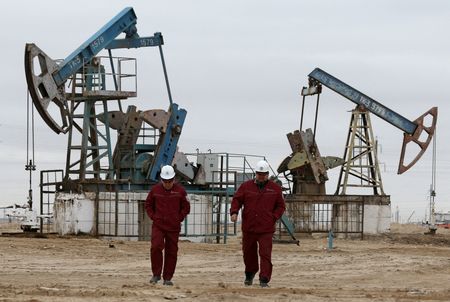 1
1 1
1

By Scott DiSavino
NEW YORK (Reuters) – Oil prices gained over 2% on Wednesday as another U.S. crude stock drawdown indicated tight supplies and investors worried about possible new Western sanctions against Russia.
Brent futures rose $2.69, or 2.4%, to $112.92 a barrel by 1:22 p.m. EDT (1722 GMT). U.S. West Texas Intermediate (WTI) crude rose $2.88, or 2.8%, to $107.12.
U.S. crude stockpiles fell by a bigger-than-expected 3.4 million barrels last week, cutting inventories in the world’s top consumer to 410 million barrels, their lowest since September 2018, government data showed. [EIA/S]
“U.S. crude inventories have shown another draw despite production ticking higher and yet one more solid SPR (Strategic Petroleum Reserve) release into commercial inventories,” said Matt Smith, lead oil analyst at Kpler, noting the crude draw was driven by rising refining activity.
After seven weeks of holding steady, U.S. crude output inched up 100,000 barrels per day (bpd) last week to 11.7 million bpd, while crude stocks in SPR fell to their lowest since May 2002, and Gulf Coast refinery utilization rose to its highest since January 2020.
Price gains were limited by surprise builds in U.S. gasoline and distillate stocks last week and lower demand for both products, traders said.
In addition to the bullish data, prices reflected that “the oil market, at least, has a strong degree of scepticism about any ‘progress'” in peace talks between Russia and Ukraine Commonwealth Bank analyst Tobin Gorey said in a note.
Russian attacks continued a day after crude prices slid as Russia promised to scale down military operations around Kyiv.
The United States and its allies plan new sanctions on more sectors of Russia’s economy, including military supply chains.
“We would see an additional 1 million barrels per day of Russian production at risk if relations with Europe worsen and an oil embargo is put in place, although we still see this as unlikely,” consultancy JBC Energy said in a note.
The Kremlin indicated that all of Russia’s energy and commodity exports could be priced in roubles, as President Vladimir Putin seeks to make the West feel pain for the sanctions.
In response to possible Russian gas supply cuts, Germany triggered an emergency plan to manage gas supplies. Other European countries also took steps to conserve gas.
Keeping the market tight, major oil producers are likely to stick to their scheduled output target increase of about 432,000 bpd when OPEC+ – the Organization of the Petroleum Exporting Countries and allies including Russia – meets on Thursday, several sources close to the group said.
But weakening demand in China is pressuring oil prices, as the country has tightened mobility restrictions and COVID-19-related lockdowns in multiple cities including the financial hub of Shanghai.
U.S. data showed private employers maintained a brisk pace of hiring in March, leading investors to worry that a possible rapid rise in interest rates could hurt economic growth and fuel demand.
(Additional reporting by Noah Browning in London, Sonali Paul in Melbourne and Muyu Xu in Beijing; Editing by Marguerita Choy and Elaine Hardcastle)